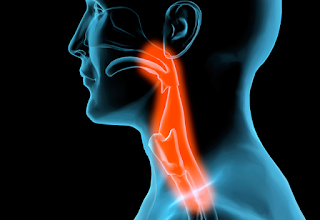Risk factors for head and neck cancer
Smoking cigarettes, cigars or pipes:
Smoking tobacco increases the risk of developing many types of head and neck cancer, including mouth cancers, throat cancers and cancer of the voice box. The more cigarettes someone smokes, and the more years they smoke for, the higher the risk.
Chewing tobacco or betel quid (paan):
Chewing tobacco or betel quid increases the risk of developing mouth cancer.
Alcohol:
Drinking alcohol is linked to cancers of the mouth and throat. The more alcohol a person drinks, and the greater number of years they drink for, the higher the risk.
Alcohol and tobacco combined greatly increase the risk of head and neck cancer. People who both smoke and drink heavily over several years have the highest risk of developing head and neck cancers.
Human papillomavirus (HPV) infection:
Cancers at the back of the tongue and in the tonsils (cancers of the oropharynx) have become more common over the past 20 years.
Many of these cancers are linked to infection with a type of virus called human papillomavirus 16 (HPV 16). It’s thought that one of the main ways this virus spreads to the mouth and throat is through oral sex. The risk of infection goes up with increasing numbers of oral sex partners.
Diet:
A diet that’s high in animal fats and low in fresh fruit and vegetables may increase the risk of developing head and neck cancer. Some types of salted fish that may be eaten as part of a Chinese diet can increase the risk of developing cancer of the nasopharynx.
Sunlight:
Exposure to sunlight over a prolonged period of time increases the risk of developing cancer on the outside of the lip. About 1 in 3 people diagnosed with lip cancer work outdoors.
Exposure to chemicals:
Prolonged exposure to some types of dust and certain chemicals increases the risk of developing cancers of the nasopharynx and sinuses. Hardwood dust, leather dust and formaldehyde (found in MDF dust) are linked to some cancers of the nasopharynx and sinuses.
Pre-cancerous conditions:
Pre-cancerous conditions of the mouth, such as oral submucosal fibrosis, leukoplakia, and erythroplakia (white or red patches in the mouth often linked to tobacco use), increase the risk of cancer developing in the mouth.
Family history:
There may be a slightly higher risk of developing a head and neck cancer if you have a close relative (a parent, brother, sister or child) who has had a head and neck cancer. Dr. Snita Sinukumar is one of the best for
head and neck cancer treatment in Pune.
Read more at-
http://www.cancerspecialistpune.com/head-and-neck-cancer-treatment-in-pune/
 |
| Head and Neck Cancer |





